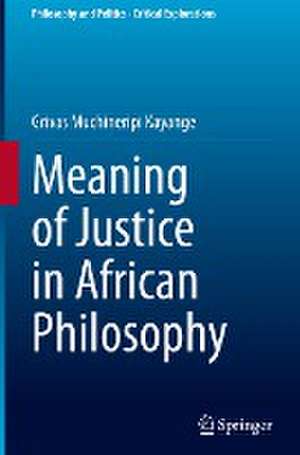Meaning of Justice in African Philosophy: Philosophy and Politics - Critical Explorations, cartea 28
Autor Grivas Muchineripi Kayangeen Limba Engleză Hardback – 28 noi 2023
Din seria Philosophy and Politics - Critical Explorations
-
 Preț: 226.46 lei
Preț: 226.46 lei - 20%
 Preț: 567.64 lei
Preț: 567.64 lei - 24%
 Preț: 633.28 lei
Preț: 633.28 lei -
 Preț: 394.29 lei
Preț: 394.29 lei - 15%
 Preț: 635.12 lei
Preț: 635.12 lei -
 Preț: 381.43 lei
Preț: 381.43 lei - 15%
 Preț: 580.17 lei
Preț: 580.17 lei -
 Preț: 384.31 lei
Preț: 384.31 lei - 18%
 Preț: 900.49 lei
Preț: 900.49 lei - 18%
 Preț: 725.92 lei
Preț: 725.92 lei - 15%
 Preț: 466.95 lei
Preț: 466.95 lei - 18%
 Preț: 728.43 lei
Preț: 728.43 lei - 15%
 Preț: 634.68 lei
Preț: 634.68 lei - 15%
 Preț: 707.78 lei
Preț: 707.78 lei - 15%
 Preț: 690.76 lei
Preț: 690.76 lei - 18%
 Preț: 723.06 lei
Preț: 723.06 lei - 18%
 Preț: 721.51 lei
Preț: 721.51 lei - 18%
 Preț: 726.55 lei
Preț: 726.55 lei -
 Preț: 369.56 lei
Preț: 369.56 lei - 18%
 Preț: 895.76 lei
Preț: 895.76 lei - 15%
 Preț: 701.90 lei
Preț: 701.90 lei - 15%
 Preț: 642.83 lei
Preț: 642.83 lei - 15%
 Preț: 648.24 lei
Preț: 648.24 lei - 20%
 Preț: 566.52 lei
Preț: 566.52 lei - 15%
 Preț: 585.73 lei
Preț: 585.73 lei - 15%
 Preț: 642.18 lei
Preț: 642.18 lei - 18%
 Preț: 731.73 lei
Preț: 731.73 lei -
 Preț: 390.25 lei
Preț: 390.25 lei
Preț: 696.35 lei
Preț vechi: 819.23 lei
-15% Nou
Puncte Express: 1045
Preț estimativ în valută:
133.29€ • 144.83$ • 112.03£
133.29€ • 144.83$ • 112.03£
Carte tipărită la comandă
Livrare economică 21 aprilie-05 mai
Preluare comenzi: 021 569.72.76
Specificații
ISBN-13: 9783031475979
ISBN-10: 3031475976
Pagini: 138
Ilustrații: XIX, 138 p. 1 illus.
Dimensiuni: 155 x 235 mm
Greutate: 0.4 kg
Ediția:1st ed. 2023
Editura: Springer International Publishing
Colecția Springer
Seria Philosophy and Politics - Critical Explorations
Locul publicării:Cham, Switzerland
ISBN-10: 3031475976
Pagini: 138
Ilustrații: XIX, 138 p. 1 illus.
Dimensiuni: 155 x 235 mm
Greutate: 0.4 kg
Ediția:1st ed. 2023
Editura: Springer International Publishing
Colecția Springer
Seria Philosophy and Politics - Critical Explorations
Locul publicării:Cham, Switzerland
Cuprins
Dedication.- Preface.- Acknowledgements.- List of Figures.- List of Tables.- Chapter 1. General Introduction.- Chapter 2. Semantic Theory of Justice in the Chichewa Language.- Chapter 3. Communitarian Theory of Justice.- Chapter 4. Vitalogical Theory of Justice.- Chapter 5. Divine Gift Theory of Justice.- Chapter 6. Ubuntu Human Nature-Based Theory of Justice.- Chapter 7. African Rights Theory of Justice.- Chapter 8. Conclusion.- Index.
Notă biografică
Grivas Muchineripi Kayange is an Associate Professor of Philosophy at the University of Malawi. He graduated in philosophy at the Gregorian Pontifical University in Rome in 2007. His expertise includes: Theories/logic and practice, African philosophy, Analytic philosophy, and Ethics. He has done research and published in different areas since 2008; some of his most recent books include; Meaning and Truth in African Philosophy (2018), Capitalism and Freedom in African Philosophy (2020), Co-editor Addiction in East and Southern Africa (2020), The Question of Being in Western and African Analytic Metaphysics (2021), and Ethics in Malawi (2021). Some of his commonly read articles include ‘Restoration of Ubuntu as an Autocentric Virtue-Phronesis Theory’ (2020), ‘Rethinking African Analytic Philosophy: A Perspectival Approach’ (2019), and ‘An Alternative to Giere’s Perspectival Realism’ (2019). The author is on a broad philosophical project that aims at the theoretical reconstruction of African philosophy so that it reflects the various perspectives and the experience of the ordinary people.
Textul de pe ultima copertă
The book examines the meaning of justice in African political philosophy, building on the use-theoretical approach. Currently, most of the philosophical works in this context advocate for a communal interpretation of the meaning of justice, such as the 'relational theory of justice' and 'Ubuntu justice as fairness.' The author argues that this foundation of justice in the community undermines the self, which is a major problem with these theories. As an attempt to go beyond communitarianism in African thought, the book recognizes other philosophical frameworks for elaborating the meaning of justice in ordinary people's experience, such as vitalism, theism, ubuntuism, and semantic framework. The author opts for a reconstructed ubuntu-based theory of the meaning of justice that reflects the traditional African experience and recuperates 'valuing self-existence' and 'valuing other-existence' as its foundations. The book further identifies the centrality of rights in defining justice intraditional African communities.
Caracteristici
Provides a comprehensive study of meaning and justice in the African setting Offers an Ubuntu-based theory of justice that reflects the traditional African experience Builds upon the use-theoretical approach to meaning
